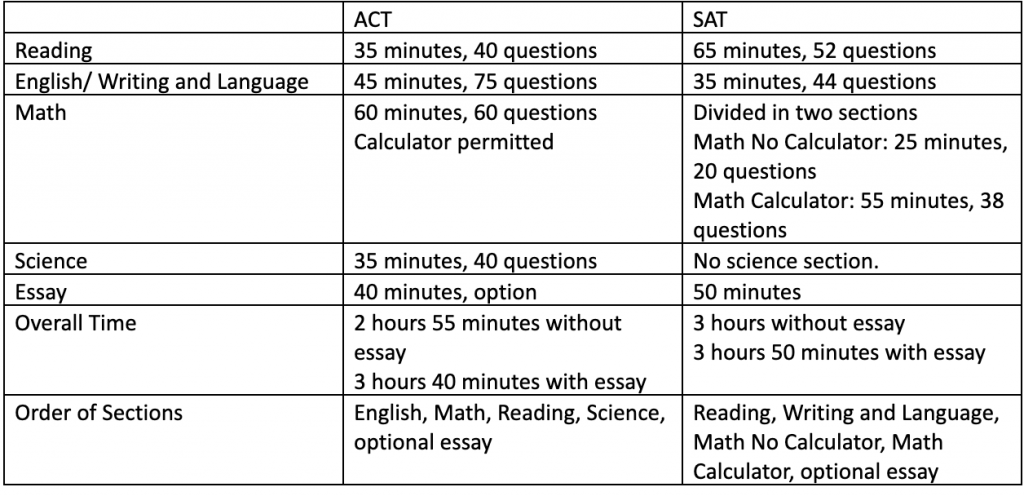When it comes to college admissions exams, both the ACT and the SAT are widely accepted by American colleges and universities. This leads many students to wonder if one test or the other is better for them.
The answer varies from student to student, but the best way to find out is to know the differences between the two tests, take a practice test of each, and make sure you have expert guidance on your college journey. You can compare an SAT score to an ACT score by checking the concordances provided by the two institutions. FLS Tutors can also help you with this process—providing a diagnostic test with personalized feedback.
Related: FLS Tutors – Services
SAT versus ACT Structure
Let’s take a look at the structure of the tests.

The ACT is slightly shorter than the SAT, clocking in at just under three hours without the optional essay. However, it allots significantly less time per question, including only 52 seconds per question in the Reading and Science sections and only 36 seconds per question in the English. The SAT, on the other hand, allows over a minute per question in nearly every section. This is a more leisurely approach, but the SAT’s questions tend to be more complex, requiring that extra time.
SAT versus ACT: Math
Now, let’s consider the math sections. The ACT math section is only one section, as opposed to two. You are permitted to use a calculator through the entirety of this 60 minute section, but no reference sheet is provided. Need a formula? Better hope you have it memorized. Compared to the SAT, the ACT also tests a slightly wider range of math topics, including logarithms, matrices and trigonometric functions, and provides a heavier emphasis on geometry. Geometry makes up approximately one third of the ACT Math section.
The SAT has two math sections, the first of which does not permit you to use a calculator. They test fewer concepts, but go more in depth. There is also a heavier emphasis on word problems and data analysis (which the ACT tests more heavily in its science section). Although there are only four possible answers on the multiple choice, approximately 20% of the SAT math questions are grid-ins, where you have to come up with the answer entirely on your own.
Students who excel at geometry or who would prefer to have a calculator available at all times might prefer the ACT. Students stronger in algebra or word problems may prefer the SAT.
ACT: Science Section
The ACT also has a science section that is unique to this test. This 35 minute, 40 question section draws on some basic information from your high school science classes, but mostly tests your ability to read and interpret charts and tables, understand the scientific method, specifically including what evidence might strengthen or weaken a hypothesis and what variables might impact the results on an experiment. Although this passage may seem straightforward, students tend to struggle with timing on this passage, as is often the case with the ACT.
SAT versus ACT: Essay
Both tests have an optional essay section, in which, once again, you will have slightly more time allotted for the SAT than the ACT essay. The SAT essay provides an excerpt from a persuasive, drawing from speeches, magazines, or other media. You’ll then need to analyze the excerpt and explain how the author works to persuade their audience, using quotations and relevant details from the text. For the ACT, however, you are provided with a topic and three perspectives. You will need to respond to the topic and perspectives with your own original argument, providing your own examples for the essay. Students who excel in English classes, particularly in literary analysis, may feel more comfortable on the SAT, whereas students with a broad base of knowledge in current events and culture may have more ease generating examples for the ACT.
Which Test is Best
Students who fit the following profile may prefer the SAT:
- You would prefer to have time to think through a problem entirely.
- You like puzzles and more complex problems.
- You are confident in your math abilities without a calculator.
- You are better at word problems than geometry.
- You are strong in literary analysis.
Students who fit the following profile may prefer the ACT:
- You would rather move quickly through problems, even if it means having less time.
- You would prefer to have a calculator in the math section.
- You are better at geometry than word problems.
- You are comfortable memorizing facts and formulas and recalling them for the Math, Science and Essay sections.
Bottom Line
Now, you should have a full view of the two tests’ sections, implementation, scoring and ideal student profile for each. Ultimately, though, the best way to decide is to take a practice version of each test, compare your scores and experiences, and then make a decision from there. Not sure where to start? FLS Tutors offers diagnostic tests and test prep via a one-on-one customized program we’ll create based on your strengths and needs. We are a concierge tutoring service that tailors our approach to every student and have experience helping students with their educational goals for over 30 years. Please contact us here to ask for a diagnostic test or if you still have questions.
Also make sure to follow the FLS Tutors Blog for more information about the SAT and ACT.



